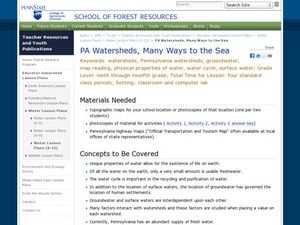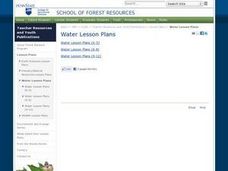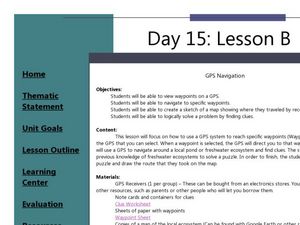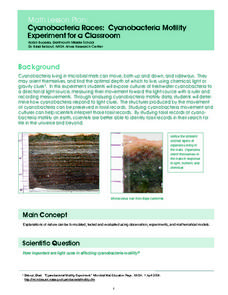Curated OER
Home, Home on the River
Students examine the complex issues that result from human use of ecologically sensitive areas. They investigate these issues from the point of view of their major/career path.
Curated OER
Lotic Environment Lesson Plans
Students create and conduct experiments on a "classroom river habitat." They manipulate the biotic and abiotic factors so that they are able to compare an artificially prepared river model to a naturally occurring lotic ecosystem.
Curated OER
Cherishing the Water of Life
Young scholars work in small groups to brainstorm a list of all creatures, plants, natural, and artificial processes that use or depend on fresh water. The class views an aquarium filled with water representing all the water in the...
Curated OER
How Much Water?
Students investigate amount of water available in different countries around the world, compare it to their daily water use, and explore how unequal distribution of water can cause challenges to survival. Students then discuss need to...
Curated OER
Plankton / Phytoplankton
Students discuss the importance of plankton in the ocean ecosystem. In this biology activity, students identify the different types plankton by observing them under the microscope. They explain how plankton population affect global climate.
Curated OER
Earth Water Distribution and Water Consumption
Students explore the need for conserving fresh water and understand that it is a limited supply. In this water consumption lesson students participate in an activity and answer questions.
Curated OER
Does a change in pH affect the growth and survival rate of aquatic plants?
Students determine if changes in pH affect the growth and survival rates of aquatic plants. They evaluate the optimal pH levels for the growth of aquatic plants.
Curated OER
Water Quality Tests Explained
Students define all eight water quality parameters and list at list one source for each of the eight water quality parameters. They determine how each of the eight parameters affect river ecosystems.
Curated OER
Wacky Water Critters
Students visit a local creek or stream. They collect water samples from the creek and observe and sort the "water critters" they find in the sample, observing smaller organisms under a microscope if necessary. They identify each organism...
Curated OER
Cypress/Tupelo Swamps
Students study the geologic history of terrain, soils, and drainage patterns. They recognize ecological processes that determine the dynamic nature of habitats. They investigate the influence of human activity on the landscape.
Curated OER
Lotic Environment
Learners assemble a classroom river model as an example of a lotic system. They control and measure biotic and abiotic information for the in-class system and compare data with a lotic system in a natural environment.
Kenan Fellows
Microorganisms in Pond Water
That is living in the water? Groups of two to three view pond water with microscopes in order to find microorganisms. They draw pictures of the ones they find in their slides. The groups compare their drawings to pictures of common pond...
Curated OER
The Water Cycle
Young scholars develop a better understanding of the need to conserve our renewable resources. In this water cycle lesson students take notes, complete a guide sheet and illustrate the water cycle.
Curated OER
PA Watersheds, Many Ways to the Sea
Students examine the water cycle and the factors that interact with watersheds. In this watersheds lesson students describe the purification process, trace the flow of infiltrate water through aquifers, and research the Internet to find...
National Wildlife Federation
Quantifying Land Changes Over Time in Areas of Deforestation and Urbanization
Is qualitative or quantitative research more convincing when it comes to climate change? In the eighth lesson during this 21-part series, scholars begin by performing a quantitative analysis of deforestation and urbanization. Then, they...
National Wildlife Federation
When It Rains It Pours More Drought and More Heavy Rainfall
Which is worse — drought or flooding? Neither is helpful to the environment, and both are increasing due to climate change. The 16th lesson in a series of 21 covers the average precipitation trends for two different climates within the...
Global Oneness Project
Reclaiming Rivers
Robert Hass's article "Rivers and Stories" underscores the importance of rivers in the development of civilization and the importance of reclaiming supposedly dead rivers and implementing policies that protect river health. Groups...
Virginia Department of Education
The Cycles of Nature
Encourage peer collaboration and assist with the creation of visual aids to identify carbon, water, and nitrogen cycles as your class learns more about nature. They discuss relative information, create a visual aid depicting the chosen...
Curated OER
"Pennsylvania Watersheds, Many Ways to the Sea"
Students trace a molecule of water through the water cycle including each of its three loops. They describe why evapotranspiration demands the largest portion of total precipitation falling on a forested watershed.
Curated OER
GPS Navigation
Students search for clues given a map and a GPS. For this technology lesson, students solve a puzzle using the clues they gathered in the activity. They write a short reflection about the activity.
Curated OER
Cyanobacteria Races: Cyanobacteria Motility Experiment for a Classroom
Students experiment to determine the effect of light on cyanobacteria movement. They graph the data of the experiment for further analysis. They watch a time-lapse video of cyanobacteria motility at a NASA website.
Curated OER
Biological Sciences
Students examine biodiversity and interrelatedness concepts. In this ecology lesson students go on a field trip and fill out a data sheet.
Curated OER
Biomes Internet Lesson
In this biomes worksheet, students use an on line source to complete a table of the Earth's biomes. Students include the types of plants in each biome, the types of animals, the climate and any details about the biomes. Students answer...
Curated OER
Connecticut Wildlife: Biodiversity and Conservation Status of Our Vertebrate Populations
Young scholars explore the different types of vertebrates found in their area. In this environmental science lesson, students perform a case study on the Common Raven. They analyze data collected from research and create charts and graphs.

























